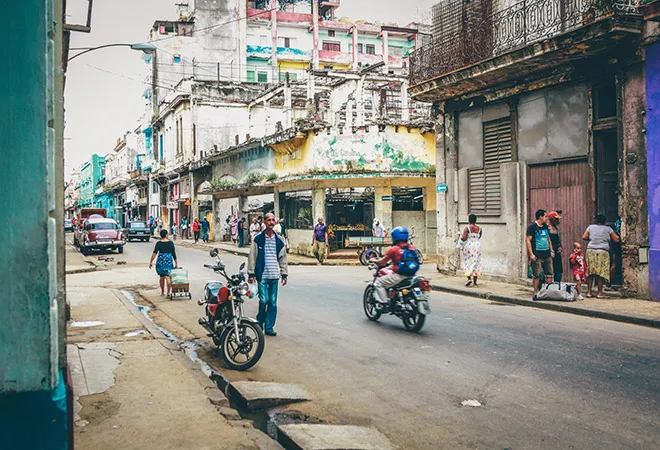-
CENTRES
Progammes & Centres
Location

According to the World Health Organization, as of 16 September, globally there have been 29,893,298 confirmed cases of COVID-19, including 941,345 deaths. As of writing, the Caribbean Disaster Emergency Management Agency (CDEMA) has reported has reported a total of 27, 373 cases and 573 deaths in 14 countries within the Caribbean Community (CARCOM)
Further, based on projections by the UN Economic Commission for Latin America and the Caribbean (ECLAC), there will be a -9.1 percent decrease in regional economic growth in 2020, a 13.5 percent rise in unemployment, an increase in the poverty rate of 7.0 percentage points, which will reach 37.3 percent of the population, and a sharpening of inequality with an average rise in the Gini index of 4.9 percentage points.
Undeniably, there is an urgent and compelling need to ‘flatten the curve’ of contagion in the Caribbean over a longer term. Such a societal goal necessitates holistic thinking and planning with specific reference to the COVID-19 responses. This article simply highlights various, yet integrated, measures that have been/can be implemented to tackle the deadly virus.
First, it is vital to ensure that policymakers have scientifically sound data to inform their various interventions and measures. This requires interdisciplinary coordinated surveillance monitoring and analysis of the pandemic, with a view to determine its patterns, its geographic spread, the differentiated impacts among social groups (given their degree of exposure, sensitivity and capacity) and the degree of success of each response strategy. This can be referred to as ‘data-driven planning’. Additionally, there is utility in establishing institutional collaborations between the health ministries and statistical units in each countries to ensure that all COVID-19 cases are disaggregated by income, sex, age, ethnicity, migratory status, disability, geographic location and other such characteristics to enable a more strategic approach to response measures, using geographic information systems to highlight high risks areas.
Second, enforcing COVID- 19 restrictions with reference to physical (not social) distancing and quarantines, and importantly, wearing of masks, are critical to the Caribbean where economic transactions are still largely conducted face-to-face. The governments and the private sector need to promote and facilitate more online economic transactions, which will be a good way to ‘bounce back’ better after the pandemic.
Third, financial relief must be provided as a safety net to the vulnerable sections of the population. Relief packages that will have positive impacts on the recipients should reach the homeless, jobless, the disabled and households whose livelihoods may have been severely disrupted or completely lost due to the pandemic. These packages should not only comprise cash vouchers, but also critical medical supplies and face masks. The next group to receive a relief package should be small businesses, since this category comprises mostly self-employed citizens. The provision of grants by governments, coupled with the rescheduling of bank loans and the negotiation of interest rates, are worth exploring within the context of each Caribbean country.
At the national level, there is an urgent need for the scaling-up and catalysing of finance to purchase drugs, medical supplies and equipment, and laboratory supplies to boost testing capacity and for the retrofitting (minor and major) of isolation units. Several governments have benefited from grants from international donors for use in their COVID-19 emergency response. For example, the World Bank approved a US$3.6 million loan for the Dominica Emergency Agricultural Livelihoods and Climate Resilience Project to restore funds that were used in the COVID-19 emergency response and support food security and climate resilience objectives. Other beneficiaries of financial assistance include Dominican Republic, Grenada, Haiti, Saint Lucia, Suriname, Saint Vincent and the Grenadines, Trinidad and Tobago, and Belize. Additionally, the UK has committed £3 million (US$3.8 million) to the Pan-American Health Organisation for the provision of essential medical supplies and management support to help public health systems around the Caribbean region combat the virus. Moreover, the UK is providing support to the Caribbean Disaster Emergency Management Agency’s Regional Response Mechanism for COVID-19 modelling and surveillance products for participating states being developed by the University of the West Indies through the George Alleyne Chronic Disease Research Centre.
Fourth, there is need to prioritise the sustainable developments goals (in particularly Goals 1, 3, 6, 7 and 9) that address human health and remain indisputably at the centre of sustainable human development. COVID-19 has exposed the limitations and deficiencies of a country’s health systems that are characterised by limited skilled labour, limited critical medical equipment and medical supplies, escalating costs, unequal access the health services needed by the population in various locations (for instance, coast versus interior; rural versus urban). The impact of the COVID-19 pandemic on airlines has further exacerbated the situation, by restricting exports and imports of medical equipment and medicines.
Fifth, Caribbean countries have an excellent opportunity to review and update their national economic, social and productive policies that aim to reduce vulnerabilities associated with urbanisation and rural deprivation, resulting in overcrowding, lack of water and sanitation services, and crowded public transportation. According to the ECLAC, inequality in the Latin America and Caribbean region positions certain groups in a particularly vulnerable situation, including older persons (85 million), informal workers (54% of regional employment), women (who make up the majority of the informal workforce, participate in unpaid work and have greater exposure to domestic violence), indigenous peoples (60 million people and some communities whose existence could be threatened), people of African descent (130 million people in 2015), people with disabilities (70 million people) and migrants.
Sixth, each Caribbean nation should develop, implement and sustain a comprehensive public awareness and education campaign, information for which should be tailored for each targeted group, depending on their characteristics, using social media to a large extent. Importantly, the message should be clear and simple, appropriate for the age group and the different social contexts, scientifically sound, and motivational. To this end, a knowledge platform should be established and shared via the internet, and supplemented by short messages and jingles via radio and television. Moreover, the platform should be interactive and allow for feedback from users.
Seventh, the police departments must at all times enforce the law regarding COVID-19 restrictions, regardless of age, wealth, education, or any other demographic characteristics, since the law is not a respecter of persons. This is particularly relevant to social gatherings in light of curfews introduced by a number of Caribbean governments. For the law to promote responsible behaviour, the fines must be urgently reviewed and revised accordingly.
Eight, preparedness and surveillance systems at ports of entry and porous borders in the region must be given equal attention in light of the current situation in some countries where migrants who are affected by the virus have been able to enter countries and socialise with nationals without early or any detection.
Finally, Caribbean countries should have regular online sessions for health ministers and other decision-makers addressing social protection issues to exchange ideas, learn from lessons of other member states, share data where possible, and develop joint COV-ID 19 response programmes where possible.
The views expressed above belong to the author(s). ORF research and analyses now available on Telegram! Click here to access our curated content — blogs, longforms and interviews.

Paulette Bynoe is a Senior Lecturer and the former Dean of the Faculty of Earth and Environmental Sciences at the University of Guyana. Paulette has ...
Read More +